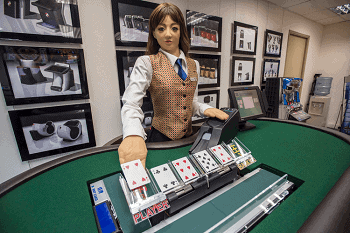Are Robot Dealers The Future of Gaming?
 Paradise Entertainment is looking to create an entirely new market of robot casino dealers. These dealers are being created with the hopes of cutting costs and opening up new markets for casino owners. The Hong Kong based company is currently looking to market its casino dealers to specific niche markets.
Paradise Entertainment is looking to create an entirely new market of robot casino dealers. These dealers are being created with the hopes of cutting costs and opening up new markets for casino owners. The Hong Kong based company is currently looking to market its casino dealers to specific niche markets.
The robots are naturally intended to be cheaper and more efficient. There is also a degree of novelty to them. Many gamblers at these casinos tend to flock to newer and flashier technology. The prototype is named Min. The robot made its debut in Macau last month.
Paradise Entertainment is currently conducting research to determine how advanced the technology should be. Implementing more advanced technology will naturally increase the production costs of each robot dealer. The robot is currently limited to only dealing cards. Paradise Entertainment is hoping to implement technology like facial recognition. Min may also possess the ability to remember casino guest names. These robots may also be multilingual. Paradise Entertainment is hoping to test these in a number of overseas markets to determine their level of appeal. They are hoping that the robots will be successful in the United States. This is because United States casino markets prefer faster levels of gaming. Paradise Entertainment doesn’t expect their technology to be as successful in Asia. This is because Asian gamblers tend to prefer the social aspect of gambling. The company’s robots currently do not possess any type of advanced speech capability. They have scanners that can recognize specific cards.
Chairman Jay Chun has stated that the robots deal cards at a 30% faster rate than their human counterparts. Paradise Entertainment’s main rival in this industry is Hanson Robotics. Hanson Robotics has sold its robotic casino dealers to a Chinese market in the past. Hanson’s robots aren’t full-fledged humans. They’re usually a robotic arm that is attached to a table.
Paradise Entertainment is looking to sell the practicality of these robot dealers. The novelty of them may also draw in new demographics of gamblers. Chun is trying to make his company’s robots as lifelike as possible. News outlets like Bloomberg have called the current prototypes creepy. The company’s robots may be able to straddle the line between being gimmicky and useful.
Robot dealers are being sold to casinos as an investment idea. Casinos don’t have to put robots on the payroll. American gambling markets are concentrated in specific areas. Las Vegas may have an oversupply of croupiers if this idea catches on. Businesses will still likely have to hire employees to oversee the operations of the robots. Casino technicians may also have to learn how to perform maintenance on these robots. The robot dealers do not appear to have a large number of moving parts, but they will still inevitably break down.
















